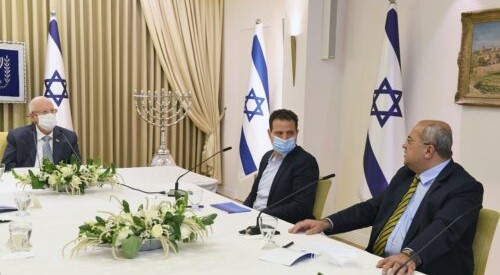Israel’s President Reuven Rivlin began his consultations with Knesset party leaders on Monday morning, April 5, towards deciding upon whom he’ll task the forming of the next government following Israel’s March 23 election, the fourth in two years. During the course of the day, hundreds of opponents to Israel’s far-right Prime Minister Benjamin Netanyahu demonstrated outside the Presidential Residence in Jerusalem amidst heavy police presence. Anti-Netanyahu protesters have held weekly demonstrations for months, calling on him to resign.

The Joint List delegation consisting of MKs Ayman Odeh (Hadash, center) and Ahmad Tibi (Ta’al, right) met with President Rivlin (left) on Monday evening, April 5, but refrained from recommending any candidate for forming a government. (Photo: GPO)
Hadash, the largest faction in the Joint List alliance, announced on Monday morning that its three MKs will not be recommending anyone for prime minister. “It became clear that Lapid had expressed willingness to form a rotation government with Yamina head Naftali Bennett, with the ultranationalist extremist settler right, and that his supposed partners in the ‘anti-Netanyahu bloc’ support such an idea,” Hadash emphasized, “Our opposition to Netanyahu is our opposition to his political method… The goal is a government that pushes for a solution to the Palestinian issue, an end to the occupation, a cessation of all forms of racial and gender discrimination, and which pursues socioeconomic policies that support the unemployed and working class.”
On Monday evening, leaders of the Joint List MKs Ayman Odeh (Hadash) and Ahmed Tibi (Ta’al) met with Rivlin and told him that they were not recommending any candidate. Odeh, head of the Joint List, reiterated its opposition to Netanyahu, not only due to his ongoing corruption trial, but primarily because of Israel’s control over the Palestinians, Netanyahu’s neo-liberal economic policies, and his attempts to undermine the country’s democracy.
Odeh told the president that he respects MK Yair Lapid, but noted statements made by Yesh Atid’s leader during the election campaign in which the latter reject the Joint List’s joining a coalition that he would form. Furthermore, Odeh said, Lapid’s emerging partnerships with right-wing parties, specifically Yamina, meant the Joint List could not endorse Yesh Atid. Odeh said the Joint List is still willing to endorse Lapid, but only if he doesn’t form a partnership with right-wing parties.
At the end of a day of consultations by party representatives with President Rivlin, Netanyahu had been endorsed by 52 MKs, Yesh Atid leader Yair Lapid by 45, and Naftali Bennett by the 7 members of his own Yamina party. The Joint List and the United Arab List (Ra’am) abstained from endorsing any candidate. Consequently, Netanyahu still lacked a clear path to forming a majority coalition in the 120-member Knesset. However, his rivals also did not appear to have any straightforward options for clinching a government.
Related:


